新生代英语基础教程2 Unit6_电子教案
新生代英语基础教程2Unit1_电子教案
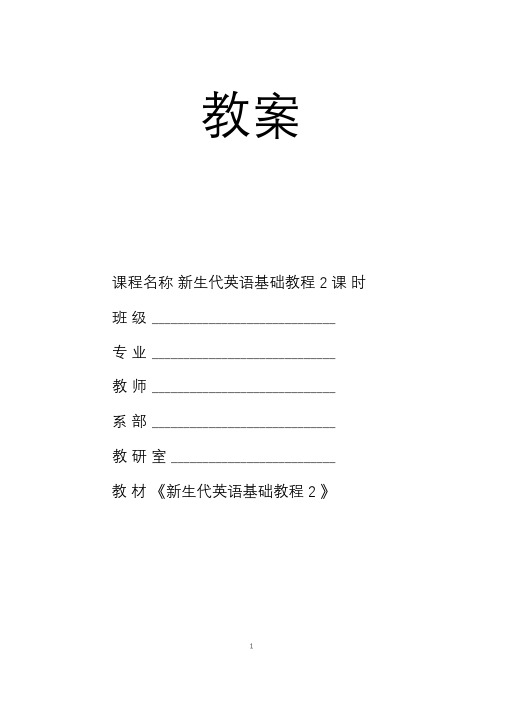
“Howm any people are in your family? and“Wherea re you from? ”I f students have trouble with these questions you can write model answers on the board for them to use when answering. For example,“Therea rein my family. ”an d“
The rest is history.
Writing
Family tree
Grammar
The possessive's
My Story
Family
教学目标
教学活动建议
Warm-up
To get students to talk about the main topic of this unit in a comfortable and relaxed manner
Writing
To improve students ' writing skills and learn to write a family description
Ask students to look at the family tree and fill in the names and their occupations. Check their work.
新生代英语基础教程Unit-6
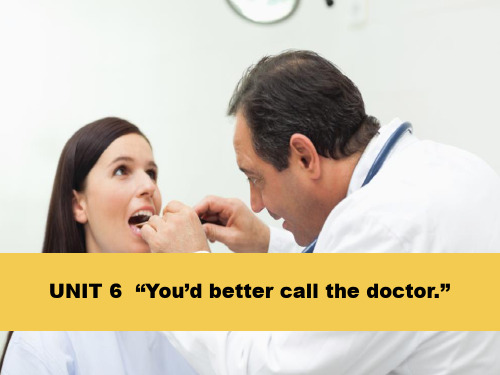
D Read the symptoms and guess what is wrong with these people. The first has been done for you.
• My throat feels itchy. • When it becomes serious, I can’t stop it. • It usually catches me in winter.
out of bed. 4 Fruit is good for you because it is full of__v_i_ta_m__in_s_ .
5 Acetaminophen, aspirin and ibuprofen are all popular__p_a_in_k_i_ll_e_rs.
仅仅是肚子有点痛。
Words & Expressions
cough n.&v. 咳嗽
e.g. I recommend these pills for your cough.
我推荐你用这些药治你的咳嗽。
Words & Expressions
英语2(基础模块)(第2版)Unit-6课件
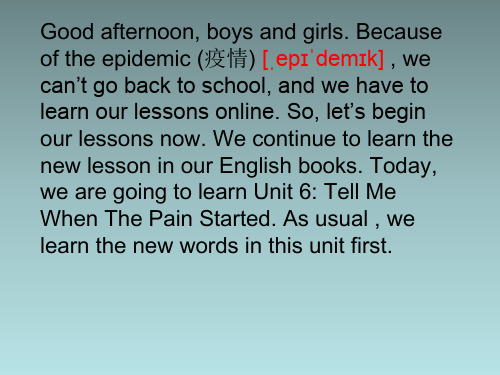
2. Eva: cough, feel cold, one day
Doctor: fever, drink more water, stay in bed warm, take the medicine three times a day
___f_e_v_e__r__
She has a fever.
1. Look and match.
stomachache cough
toothache headache
fever back pain
What’s the matter with him?
_b_a__c_k__p_a__in___
He has back pain.
Will this be OK for you? Annie: Can you make it earlier? Nurse: Well, let me see. What about 10 a.m. this morning? Annie: 10 a.m. is fine. Nurse: OK, see you then. Annie: Thank you very much.
and 2 p.m. today.
Nurse: Good morning, Dr. King’s office. Annie: Good morning, my name is Annie and I would like to
make an appointment. Nurse: What’s wrong with you? Annie: I ’ve had a sore throat. Nurse: How long have you felt this way? Annie: For two days. I want to see Dr. King today. Nurse: I see. Well, Dr. King is free at 2 p.m. this afternoon.
全新版大学英语综合教程2--第二版Unit6电子教案
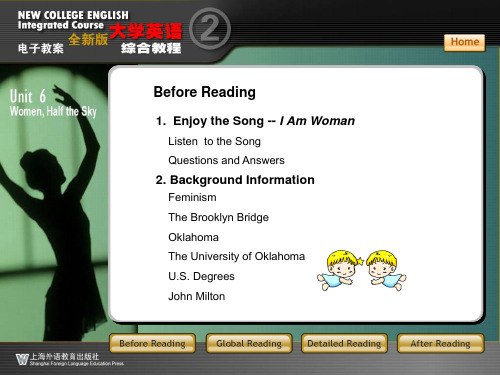
4. What happens to women if you try to break their will?
You can bend them but you never break them. It only serves to make them more determined to achieve their final goal. Their suffering and struggle has made them wise and strong.
But I’m still an embryo With a long, long way to go Until I make my brother understand
Feminism
In the 1960s feminism (=the belief that women and men are equal in abilities and should have equal rights and opportunities) became the subject of intense debate when the women’s liberation movement encouraged women to reject their traditional supporting role and to demand equal status and equal rights with men in areas such as employment and pay.
新标准大学英语第二册Unit6教案

新标准⼤学英语第⼆册Unit6教案新标准⼤学英语综合教程第⼆册Unit 6 Sporting LifeMy dream comes truePredictingIdentifying features of a formal writing style through readingOrganizing Students’ oral discussion by showing them how to present information and opinionsAnalyzing trends by using patterns observed and researched athlete, born in 1972, who won the gold medal for the heptathlon at the 2000 Sydney Olympic Games. After her 2000 Olympic gold medal event, she was given an OBE, an honor given by the Queen, to recognize her contribution to sports and other championships.In the 2004 Olympic Games she had to withdraw due to injuries. She retired from sports in 2005. 2. Why is an Olympic medal prized more highly than other sports trophies? 3. Can spectators help an athlete to win?4.Is it important to support your favorite player, your teamor your country?Answer the questionsWhich phrases in the passage tell us that: 1. the race took place in the evening?2. the writer felt very nervous before the race?3. the writer had decided to use the strategy she had worked out earlier?4. the writer was going to put all her effort into the race?5. nothing except winning or losing would be important after the race?6. the writer stopped thinking about one thing and started thinking aboutsomething else?7. the writer refused to allow herself to think that she’d won?8. the writer worried that she might have lost? sudden change in movement 轻柔地;轻轻地 e.g.1. She kissed her baby gently on the cheek.她温柔地吻了吻她孩⼦的脸颊。
大学英语基础教程(北大修订版)教案第二册Unit Six
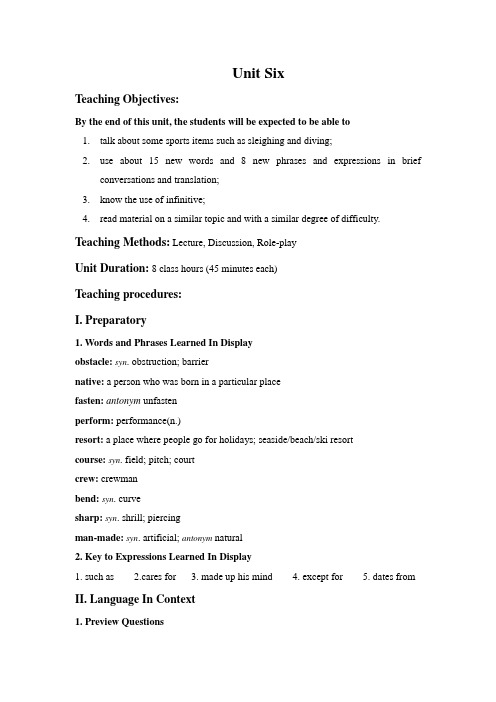
Unit SixTeaching Objectives:By the end of this unit, the students will be expected to be able to1.talk about some sports items such as sleighing and diving;e about 15 new words and 8 new phrases and expressions in briefconversations and translation;3.know the use of infinitive;4.read material on a similar topic and with a similar degree of difficulty. Teaching Methods: Lecture, Discussion, Role-playUnit Duration: 8 class hours (45 minutes each)Teaching procedures:I. Preparatory1. Words and Phrases Learned In Displayobstacle: syn. obstruction; barriernative: a person who was born in a particular placefasten:antonym unfastenperform: performance(n.)resort: a place where people go for holidays; seaside/beach/ski resortcourse:syn. field; pitch; courtcrew: crewmanbend:syn. curvesharp:syn. shrill; piercingman-made:syn. artificial; antonym natural2. Key to Expressions Learned In Display1. such as2.cares for3. made up his mind4. except for5. dates from II. Language In Context1. Preview Questionsi.Do you have any favorite sports? What are they? Why?ii.Please list some sports that require two players.iii.Can you name any favorite Chinese or international sports players?Keys for reference:① there are various answers according to the individuals. The following expressions may be of assistance.Basketball is one of my favorite sports. I like watching NBA because it not only brings entertainment to the inspectors, but I have learnt the importance of teamwork.②Sports that require two players include badminton, table tennis, tennis, fencing, chess, judo, wrestling and so on.③ My favorite sports players are Yao ming, Beckham, Iverson, Liu Xiang, Lang Ping, Luo Xuejuan, and Schumacher. Of the many sports players, I like Liu Xiang best. After he won the gold medal in 110 meter hurdles at 2004 Olympic Games, Liu Xiang became the idol in my heart. He is worth the title of “the person who moves Chinese in 2004”.2. Information Related To The Texti.EskimosAny member of a group of peoples who, with the closely related Aleut, constitute the chief element in the native population of the Arctic and sub-Arctic regions of Greenland, Alaska, Canada, and far eastern Russia.Self-designations vary among the languages and dialects of the Eskimo peoples.They include such names as Inuit, Inupiat, Yupik, and Alutiit, each of which is a regional variant of “the people” or the “real people.” The oldest known Eskimoculture is that from a site on Umnak Island in the Aleutians, for which an age of 3,018 (plus or minus 230) years was recorded. In the late 20th century there were an estimated 17,000 self-described Eskimo: some 51,000 in Greenland and Denmark, 43,000 in Alaska, 21,000 in Canada, and about 1,6000 in Siberia.Traditional Eskimo culture was totally adapted to an extremely cold, snow-and icebound environment in which vegetable foods were almost nonexistent , trees were scarce, and caribou , seal, walrus, and whale meat, and fish were the major food sources. Dogsleds were the basic means of transport on land. Eskimo clothing was fashioned of caribou furs, which provided protection against the extreme cold. In summer many Eskimos lived in animal-skin tents. Their basic social and economic unit was the nuclear family, and their religion was animistic.ii. HollandHistorical region of the Netherlands, divided since 1840 into the provinces of Noord-holland (north Holland) and Zuid-holland). It constitutes the flat, low-lying northwestern portion of the modern country.Holland originated in the early 12th century as a fief of Holy Roman Empire and was ruled by a dynasty of counts that traced its origin to the 9th century. These nobles had reemerged in the 10th century after Viking devastation of the coastal area had ended, and they proceeded to expand their territory of present Noord-Holland northward, at the expense of the Frisians, and eastward and southward, which involved them in a series of wars with the bishops of Utrecht.The name Holland was derived from the region around Dordrecht, which was known as Holtland(“wooden land”).3. Language Points1. Many sports began as ways to overcome obstacles.obstacle n. thing in the way that either stops progress or makes it difficulte.g. Not being able to pass his mathematics exam proved an obstacle to his career.2. Natives of northern countries such as Lapps, Finns, and Eskimos were the first experts in sleighing and sledding.native n.1) person born in a place, country, ect, and associated with it by birthe.g. a native of London, Wales and India.2) local inhabitante.g. when we’re on holiday in Greece, we live like the natives.3. Eskimos raced across frozen ground at breakneck speedbreakneck adj. dangerously faste.g. drive, ride, travel, ect at breakneck speede.g. a football pitch illuminated with floodlights4. Sleighing by boats dates from the seventeenth century.date back to/from have existed sincee.g. This castle dates from the 14th century.Our partnership dated back to 1960.5. The Dutch made up their minds to sail their boats with runners fastened beneath the bow, or front, a boat became a sleigh.Make up one’s mind come to a decisione.g. I’ve made up my mind to be a doctor.Have you made up your mind where to go for your holiday?6. The riders, except for the driver, bend backward.Except (for sb./sth.) not including (sb./sth.); but note.g. The restaurant is open every day except Monday.I can answer all the questions except for the last.She remembered nothing (about him) except that his hair was black.7.It is simply a board bound to two well-oiled runners.bind v. tie or fasten, e.g. with ropee.g. they bound his legs so he couldn’t escape.He was bound to a chair and left.8. Sleighs still perform the same task.Perform v.1) do (a piece of work, something. One is ordered to do, something. One has agreed to do)e.g. perform an operation to save his life2) act (a play), play (a piece of music) or to do tricks to entertain an audiencee.g. they are performing his piano concerto tonight.III. Toward Productive LanguageLanguage Points1. For two years, not once did she clamber onto a board.clamber v. climb, esp. with difficulty or effort , using the hands and feete.g. The children clambered over the rock.2. Fu joined the diving camps at age 7 and was shipped off to a Beijing sports schoola couple of years latership sb./sth. off send sb. awaye.g. the children had been shipped off to a boarding-school at an early age.3. Occasionally they would come to diving meets in her native Hubei province, and would scan the audience from the platform trying to locate them.occasionally adv. now and then; at timese.g. he visits me occasionally.4. In January, less than a year after she re-emerged, her crisp dives captured a silver medal at the Diving World Cupcapture v.1) take or win (sth.) by force or skille.g. capture a town2) take (sb./sth) as a prisonere.g. capture an escaped convictthis advertisement will capture the attention of TV audiences.IV. Homework1.Dictation of the new words;2.More grammar exercises(present participles);3.Translation (from Chinese to English)1)英语不是我们的母语。
Unit2_第6课时教案
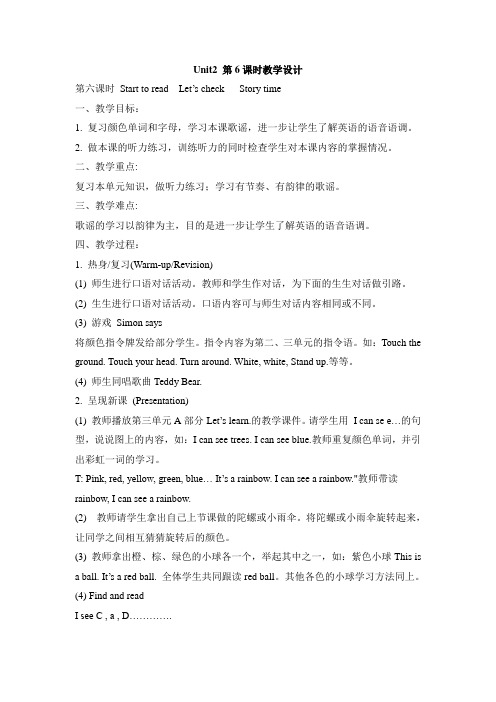
Unit2 第6课时教学设计第六课时Start to read Let’s check Story time一、教学目标:1. 复习颜色单词和字母,学习本课歌谣,进一步让学生了解英语的语音语调。
2. 做本课的听力练习,训练听力的同时检查学生对本课内容的掌握情况。
二、教学重点:复习本单元知识,做听力练习;学习有节奏、有韵律的歌谣。
三、教学难点:歌谣的学习以韵律为主,目的是进一步让学生了解英语的语音语调。
四、教学过程:1. 热身/复习(Warm-up/Revision)(1) 师生进行口语对话活动。
教师和学生作对话,为下面的生生对话做引路。
(2) 生生进行口语对话活动。
口语内容可与师生对话内容相同或不同。
(3) 游戏Simon says将颜色指令牌发给部分学生。
指令内容为第二、三单元的指令语。
如:Touch the ground. Touch your head. Turn around. White, white, Stand up.等等。
(4) 师生同唱歌曲Teddy Bear.2. 呈现新课(Presentation)(1) 教师播放第三单元A部分Let’s learn.的教学课件。
请学生用I can se e…的句型,说说图上的内容,如:I can see trees. I can see blue.教师重复颜色单词,并引出彩虹一词的学习。
T: Pink, red, yellow, green, blue… It’s a rainbow. I can see a rainbow."教师带读rainbow, I can see a rainbow.(2) 教师请学生拿出自己上节课做的陀螺或小雨伞。
将陀螺或小雨伞旋转起来,让同学之间相互猜猜旋转后的颜色。
(3) 教师拿出橙、棕、绿色的小球各一个,举起其中之一,如:紫色小球This isa ball. It’s a red ball. 全体学生共同跟读red ball。
英语2(基础模块)(第2版)Unit 6课件精选课件
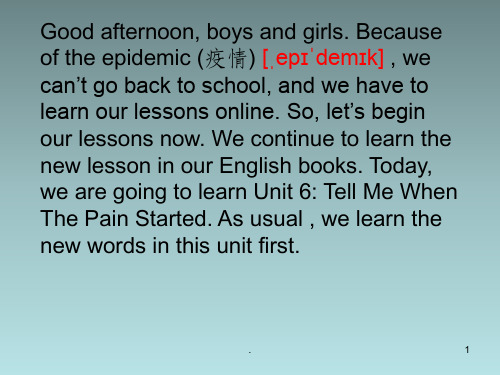
.
11
2. Listen and order.
4C
A
3B
D
The correct order: 1. __3B___ 2. __A___ 3. __D___ 4. __4C___
.
12
.
13
3. Listen and answer.
1: Who is Tom talking to? _th_e__re_c_e_p_ti_on_i_s_t _of_D_r_._S_m_i_th_’s _o_ff_ic_e_. ________________
stomachache cough
toothache headache
fever back pain
What’s the matter with him? He is coughing.
__c_o__u_g_h___
.
6
1. Look and match.
stomachache cough
toothache headache
He has back pain. .
10
• 询问某人是否不舒服时,用下列句型: • What’s the matter with him/her?或者回答 • What’s wrong with him/her?
• 回答时要注意表示病痛的词是名词还是动 词
• He/She has (a) +病痛的名词。 • He/She is 动词+ing.
fever back pain
What’s the matter with him?
He has a STOMACHACHE.
_s__to__m_a__c_h_a_c_h__e_
新生代英语基础教程2_Unit 6_测试卷附答案

Unit TestUnit 6 “You’d better call the doctor.”Part 1 Listening ComprehensionSection AA. Listen to the conversation. Then choose the best answer to complete each sentence.1. Eric has a ________.A. toothacheB. stomachacheC. headache2. Eric went to the ________ yesterday.A. parkB. zooC. beach3. Eric didn’t ________.A. drink enough waterB. go swimmingC. sunbathe4. Vicky gives Eric some ________.A. foodB. moneyC. medicine5. Vicky usually drinks around ________ glasses of water a day.A. twoB. sevenC. nineB. Listen to the conversation. Then choose the best answer to each question below.6. Where does Zoe want to go?A. To the hospital.B. To the workplace.C. To the movie theater.7. What does William tell Zoe to bring with her?A. A telephone.B. A thermometer.C. Her ID and insurance card.8. How will they get to their destination?A. Zoe will drive William there.B. William will drive Zoe there.C. They will walk together.C. Listen to the conversation. Then choose the best answer to each question below.9. How can you buy “Doxy’s 2-in-1”?A. You must get a prescription first.B. You can buy it from any leading pharmacy.C. You can buy it from the hospital.10. Which is NOT the effect of “Doxy’s 2-in-1” according to the advertisement?A. Making you drowsy.B. Unblocking your nose.C. Stopping you coughing.Section BListen to the following sentences and write down what you hear on the lines.1.The doctor will ____________ my X-ray to see if I have a broken bone.2.Your finger is so ____________! It’s twice the size of your other fingers.3.I ____________ my wrist. It really hurts when I write.4.Bill has a big black ____________ on his eye.5.Joel applied compression to his ____________ foot.Part 2 Vocabulary and StructureSection AA. Fill in the blanks with words from the box.1.The rise in inflation was just one __________ of the poor state of the economy.2.There is no simple __________ for unemployment.3.Make sure you understand exactly how to take your medicines before you leave the__________.4.Fresh fruit and vegetables provide fiber and __________.5.Wine contains about 10% __________.6.Her head still hurt, and she felt slightly __________ and disoriented.7.The nurse shook the __________ and put it under my armpit.8.Linda demonstrated the proper way to __________ the face.9.She started __________ blood so they transferred me to a hospital.10.From yesterday, the pain became very serious, even the __________ could not help.Section BMatch the words to the definitions.1.daily2.dosage3.prescription4.side effect5.over-the-counter A.of drugs and medicines that can be obtained withouta prescriptionB. a piece of paper on which a doctor writes the detailsof the medicine that someone needsC.every dayD.bad effect that a drug has on youE.an amount of a medicine that is taken regularlySection CChoose the best answer to complete each sentence.1. Joseph finished __________ his homework.A. writeB. to writeC. writing2. These drugs are available over-the-counter without a(n) __________.A. infectionB. dosageC. prescription3. Lily would like __________ to Germany.A. to moveB. movesC. moving4. Headaches are one of the __________ of the drug.A. alcoholB. side effectsC. vitamins5. Would you mind __________ us clean up before you leave?A. helpingB. helperC. helps6. I plan __________ abroad this winter.A. to goB. goingC. goes7. He chose __________ the blue jacket.A. buyingB. to buyC. buys8. Why do you keep __________ him questions?A. to askB. askC. asking9. Do you need __________ this bus?A. to catchB. catchC. catching10. They avoid __________ junk food.A. eatsB. to eatC. eatingSection DComplete the passage, using the correct verb form.A headache is caused by chemical activity in your brain, 1.__________ (or / because / but) the blood and muscles in and around your head. 2.__________ (As a result / Therefore / In addition), some people may carry genes that make them more likely to be affected by headaches. There are some things that may 3.__________ (treat / examine / cause) you to get a headache. Consuming alcohol, especially red wine, is said to be a common trigger for a headache. Certain food, 4.__________ (such / such as / so) processed meat may also cause headaches. Lack of sleep or poor posture could be another cause. Research has 5.__________ (show / shown / showing) that skipping meals and being under stress can give people headaches too.Part 3 Reading ComprehensionTask 1Read the passage. Choose the best answer.How to treat a cold•Drink plenty of water.When having a fever, drinking lots of water will help you feel better. Don’t drink coffee or juice as these will dehydrate you and make you feel worse.•Eat chicken soup.Studies show that people who eat chicken soup g et better more quickly. It doesn’t need to be homemade stuff—shop-bought soup works just as well.•Gargle with a salt solution.Rinsing with a simple mixture of salt and water can help relieve a sore and scratchy throat. You can take this several times a day.•Rest as much as possible.Stay at home if you can, as this will help to avoid passing your cold to other people. Sleeping at least eight hours a day will help you to recover more quickly.1. What is the purpose of this passage?A. To tell you how to avoid getting a cold.B. To help you treat a cold.C. To explain what causes a cold.D. To explain what causes illnesses in general.2. What should you drink if you have a cold?A. Water.B. Coffee.C. Alcohol.D. Juice.3. What kind of chicken soup is good for a cold?A. Shop-bought.B. The kind your mom makes.C. Homemade or shop-bought.D. The kind with noodles.4. What will salty water help with?A. A sore throat.B. A sore stomach.C. A fever.D. A runny nose.5. According to the passage, why should you stay at home if you have a cold?A. So that you can keep warm.B. So that you can sleep.C. So that you can watch a lot of television.D. So that other people don’t get infected.Task 2Read the passage. Fill in the blanks with no more than three words.Hi Ella,I’m so sorry to hear that you have influenza! That’s so unlucky. Your mom told me that you can’t have any visitors for one week, so I thought I’d send you an email. I guess you’ll still b e online, even though you’re sick, right?I had influenza last year and I remember how horrible it was, so I feel really sorry for you.I had a splitting headache, and I felt hot and cold all the time. I just couldn’t get comfortable. I didn’t want to eat anything either! Is that how you’re feelin g?Well, you missed an English grammar test today, and I suppose you’ll be very sorry about that. Don’t worry about class work, though; I’ll bring you all my notes when you feel better. Let me know when you’re ready for a visitor! I miss you.Fiona1.Fiona is so ____________ Ella’s got the influenza.2.Fiona is writing because Ella has influenza and can’t ____________.3.Fiona had ____________ last year and felt really bad with it.4.Fiona has promised to bring Ella notes from classes when Ella ____________.5.Fiona wants Ella to tell her when she is ready ____________.Task 3Read the passage. Fill in the blanks with no more than three words.Student health at Greenstone CollegeWe want our students to be healthy so they can make the most of their studies here. Please follow these steps for well-being.Register with a doctor at the school clinic if you haven’t done so. This means that if you do get sick, it will be easy to get an appointment.Eat healthily. It’s possible to eat well without breaking the bank. Please pick up our free cook books for good, cheap recipes.Take regular exercise. We have lots of sports clubs on campus, so you can enjoy everything from baseball to yoga. Regular exercise is good for you, and means that you are more likely to stay healthy.Please stay at home if you do get a cold. If you come to class with a cold, you risk infecting other students and college staff.1.What is the purpose of this passage?To help students ______________.2.Why should students register with a doctor at the school clinic?So they can get ______________ easily when they get sick.3.What can students pick up to help them eat healthily?They can pick up ______________.4.What clubs are there on campus?Lots of ______________—everything from baseball to yoga.5.What should you do if you do get a cold?You should ______________.Unit 6 “You’d better call the doctor.”听力脚本Section AA. Listen to the conversation. Then choose the best answer to complete each sentence. Vicky: Hey Eric, what’s wrong? You don’t look so good.Eric: I’ve got a really bad headache.Vicky: How long have you had it?Eric: It started yesterday evening.Vicky: What did you do yesterday?Eric: I went to the beach. I was swimming and sunbathing.Vicky: Did you drink plenty of water?Eric: I had one small bottle.Vicky: That probably wasn’t enough. I think you got dehydrated. That is a common cause of headaches.Eric: Do you have any painkillers?Vicky: Yes, I do. Take two of these and drink three glasses of water. You will be fine. Eric: Thanks, Vicky. How many glasses of water do you usually drink a day?Vicky: I usually drink around seven. Even more if I’m exercising or in the sun.B. Listen to the conversation. Then choose the best answer to each question below. Zoe: Hello, William. Sorry to bother you so late at night. I really need your help. William: Zoe? Is that you? What’s wrong?Zoe: I think I need to go to the emergency room.William: I will take you there immediately. What’s wrong?Zoe: I woke up with a terrible stomachache and a temperature of 105 degrees. William: Make sure you have your ID and insurance card when I get there.Zoe: I’m grabbing them now.William: Do you know where the nearest emergency room is?Zoe: It’s right next to the river.William: I’m getting in the car now. I’ll be over there in about 15 minutes to pick you up, OK?Zoe: Thanks a lot, William. I owe you.William: That’s what friends are for.C. Listen to the advertisement. Then choose the best answer to each question below.Are you experiencing a bad cough and cold? Then you should try Doxy’s new 2-in-1 cough and cold relief pill. Doxy’s pill is available over-the-counter, so you won’t need to waste time or money seeing a doctor to get a prescription. Just go into any leading pharmacy and ask for “Doxy’s 2-in-1”. This pill will help you stop coughing, unblock your nose, and won’t make you drowsy. What are you waiting for? Try Doxy’s 2-in-1 today.Section BListen to the following sentences and write down what you hear on the lines.1.The doctor will examine my X-ray to see if I have a broken bone.2.Your finger is so swollen! It’s twice the size of your other fingers.3.I sprained my wrist. It really hurts when I write.4.Bill has a big black bruise on his eye.5.Joel applied compression to his sore foot.参考答案Part 1 Listening ComprehensionSection A1. C2. C3. A4. C5. B6. A7. C8. B9. B 10. ASection B1. examine2. swollen3. sprained4. bruise5. sorePart 2 Vocabulary and StructureSection A1. symptom2. remedy3. pharmacy4. vitamins5. alcohol6. dizzy7. thermometer8. cleanse9. coughing 10. painkillersSection B1. C2. E3. B4. D5. ASection C1. C2. C3. A4. B5. A6. A7. B8. C9. A 10. CSection D1. or2. In addition3. cause4. such as5. shownPart 3 Reading ComprehensionTask 11. B2. A3. C4. A5. DTask 21. sorry to hear2. have any visitors3. influenza4. feels better5. for a visitorTask 31. to be healthy2. an appointment3. free cook books4. sports clubs5. stay at home。
英语基础模块第二册Unit6教案
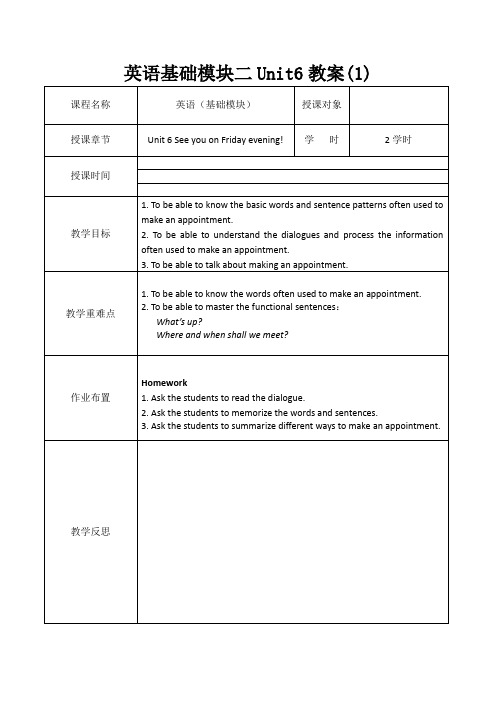
3. To be able to understand an invitationletter and write an invitation card.
教学重难点
Help the students topracticethe important readingstrategies:scanning, skimming and guessing themeaning ofunfamiliar words.
II.Present the key sentences on the slide and explain their meanings.
Read the wordson Page 57.
Show the picture of Judy and
Carl.Answer the question:
What are they going to do?
教学重难点
1.To be ableto know the wordsoften used to make anappointment.
2. To be able tomaster the functional sentences:
What’s up?
Where and when shall we meet?
2. To be able to understand the dialogues andprocesstheinformation often used to make an appointment.
3. To be able to talk aboutmaking an appointment.
新一代(基础篇)视听说教程Book-2-Unit-6PPT课件
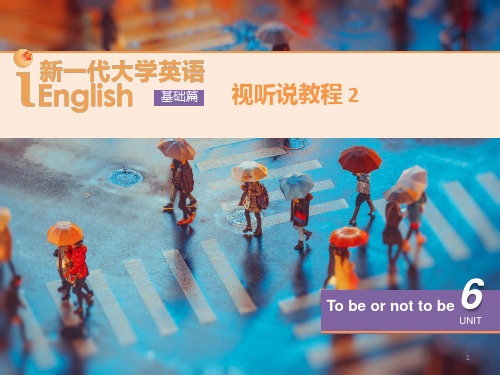
新新一一代代大大.学学英英语语((基基础础篇篇)) 视视听听说说教教程程121 UUnniti5t461
Prepare
Reference answers
Scenario 1 Donna and Pete’s friends want them to go to a party. However, they both have a lot of homework and they know they will be asked to drink alcohol at the party. What should Donna and Pete do?
an addition to something that has been previously said the beginning of a new subject a summary
causes, effects, results, and consequences
新一代大.学英语(基础篇) 视听说教程 12 Unit1146
新一代大.学英语(基础篇) 视听说教程 12 Unit346
Prepare Learning objectives
英语2(基础模块)(第2版)Unit 6课件讲解学习

He has back pain.
• 询问某人是否不舒服时,用下列句型: • What’s the matter with him/her?或者回答 • What’s wrong with him/her?
• 回答时要注意表示病痛的词是名词还是动 词
• He/She has (a) +病痛的名词。 • He/She is 动词+ing.
appointment. 我想预约。
What’s wrong with you? =What’s the matter with you?你怎么了?
I have a runny nose. And I cough all the time.
How long have you felt this way? 你这样感觉有多久了?
fever back pain
What’s the matter with her?
She has a toothache. ___t_o_o_t_h__a_c_h_e___
1. Look and match.
stomachache cough
toothache headache
fever back pain
2. Listen and order.
4C
A
3B
D
The correct order: 1. __3B___ 2. __A___ 3. __D___ 4. __4C___
3. Listen and answer.
1: Who is Tom talking to? _th_e__re_c_e_p_ti_on_i_s_t _of_D_r_._S_m_i_th_’s _o_ff_ic_e_. ________________
新生代英语高级教程2+Unit+6_电子教案

教案课程名称新生代英语高级教程2 课时班级专业教师系部教研室教材《新生代英语高级教程2》1515151515151515补充教学资源Vocabulary Builder参考译文男:我有跟你说我的新爱好吗?女:没有,是什么?男:我开始对摄影感兴趣了。
女:摄影?什么类型的?男:其实,我喜欢给食物拍照片。
女:食物?听着有些无聊。
男:不!其实这非常酷。
我去餐馆给我点的食物拍照。
然后我把照片发布在我的博客上,并点评这些食物。
女:哦,所以这些照片是用来写餐馆评论。
有点意思……博客叫什么名字?男:叫作“吃喝在纽约”。
你可以用谷歌搜索一下。
女:我会的!期待看你发布的文章。
15Show Time参考译文娜奥米:好了,让我们准备开始吧。
赫克托:这游戏叫什么名字来着?娜奥米:叫“神奇高手”。
这儿有三个类别的问题:美国地理、美国政府和历史上的重大时刻。
赫克托:游戏规则是怎样的?娜奥米:非常简单。
我们轮流回答问题。
回答正确的参与者得一分。
玛特奥:好的,让我们先从地理开始,因为这是我的长项。
娜奥米:好,听第一题。
位于国家中心的是哪个州:亚利桑那州、科罗拉多州还是堪萨斯州?赫克托:我知道——嗯……是科罗拉多州?玛特奥:科罗拉多州和亚利桑那州都位于西南部。
所以肯定是堪萨斯州。
娜奥米:一点儿没错,玛特奥!堪萨斯州位于美国中部。
它所在的地区称为中西部地区。
赫克托:这我知道。
你只是运气好,玛特奥。
玛特奥:别嫉妒,朋友。
我生来聪明。
那么,选手们,接下来你们选择哪个类别?赫克托:来试试美国历史吧。
玛特奥:好。
这个问题不错:在美国历史最悠久的城市是哪个?娜奥米:我知道!玛特奥:说说看。
娜奥米:我想答案肯定是纽约。
纽约是美国规模最大且历史最悠久的城市。
玛特奥:你呢,赫克托?15赫克托:我不同意。
我认为波士顿是美国历史最悠久的城市。
玛特奥:真遗憾,你俩都错了。
美国历史最悠久城市既不是纽约也不是波士顿。
娜奥米:那答案是什么?玛特奥:美国历史最悠久的城市是圣奥古斯丁,在佛罗里达州。
《英语基础教程》第二册word版电子教案 Book 2 Unit 6 教案 Book2Unit6-2

Unit 6 Tell me how long have you been like this.〔第二课时教学设计〕一、教材分析1.教学内容本课时系教材?英语根底教程?〔2〕第六单元的第二课时,包括Reading and writing 局部,具体内容为:能读懂关于以健康为主题的文章;简单描绘睡眠问题并给出改善睡眠的建议;同时了解根本的保健知识,了解并有意识的培养健康的饮食、生活方式,养成积极健康的生活习惯。
2.教学重点、难点⑴教学重点掌握重点词汇和短语;学生能通过阅读,读懂有关睡眠的相关知识,提取改善睡眠的方法,提高获取相关大意和细节信息的能力;培养学生阅读并整合信息的能力,而且能读以致用,通过阅读能写出改良健康睡眠建议的小短文。
⑵教学难点灵活正确使用重点词汇和短语;能根据关键句型写出改善睡眠的小文段。
二、教学目标1.知识目标⑴理解并掌握关于睡眠介绍的相关词汇,如:anxious, avoid, nap, regulate, solution, have difficulty in, write down⑵掌握描述旅行活动的句型,如:... do not have good sleep.You have difficulty in falling sleep,keeping through the night, or waking up too early…When you can’t fall asleep….regulate your body clock....2.能力目标⑴能看懂睡眠问题和解决方案;⑵能写出改善睡眠的小文段。
3.情感目标⑴能够关注自己的睡眠状况;⑵用积极的人生态度、健康的生活方式面对生活三、教学步骤Step One Lead-in1.Revision:Have the students to speak out the common symptoms as much as possible.〔设计意图:通过列举病症,翻译卡片,帮助学生激活旧知,为后面熟练准确的运用做好准备。
最新版创新高职英语基础教程实用2册精品电子教案unit 6 Yes, High Technology, but Wait!Part B

B2 Read.
Deteriorating sleep patterns
Back pain
Headache
Hearing problems
B2 Read.
Eye problems
Neck strain/injury Laziness & Obesity
Knee pain
Carpal tunnel syndrome (腕管综合征)
B1 Look and say.
Telephone was replaced by Mobile phone Television is getting thinner . Meanwhile people are getting bigger
Instead of waiting nervously for the phoneห้องสมุดไป่ตู้call, people nowadays can contact with each other on Twitter or QQ in front of the computer.
B2 Read. Read
The Social Problems Being Caused by TECHNOLOGY
Lead-in activity Guided reading After-reading reflection Resources
B2 Read.
Lead-in activity Questions for discussion (open): 1. Among the following ways of communication, which one do you prefer? Why?
B2 Read.
新生代英语基础教程Unit 6
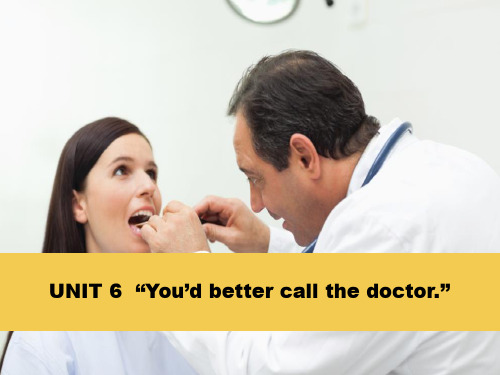
Jason: Yes, I think so.
Doctor: Here is some acetaminophen. It will help with your headaches.
You should also take some rest. How about this cough? Jason,
infection n. 感染;传染
e.g. He suffered from a lung infection.
他的肺部感染了。
Words & Expressions
精选版课件ppt
15
itchy adj. 发痒的
e.g. I can’t reach the itchy place on my back.
寒冷加剧了我膝盖的疼痛。
Words & Expressions
精选版课件ppt
27
Check. 有,办妥。
e.g. --Do you have your tickets? --Check.
--票拿了吗? --拿了。
Words & Expressions
精选版课件ppt
28
in good hands 受到良好的照顾
精选版课件ppt
22
WORDS & EXPRESSIONS
acetaminophen couch elbow knee Check. in good hands
精选版课件ppt
23
acetaminophen n. 醋氨酚
e.g. Acetaminophen is a kind of painkiller.
a 2 Mrs. Sanchez feels Mr. Sanchez’s head to see if
- 1、下载文档前请自行甄别文档内容的完整性,平台不提供额外的编辑、内容补充、找答案等附加服务。
- 2、"仅部分预览"的文档,不可在线预览部分如存在完整性等问题,可反馈申请退款(可完整预览的文档不适用该条件!)。
- 3、如文档侵犯您的权益,请联系客服反馈,我们会尽快为您处理(人工客服工作时间:9:00-18:30)。
教案课程名称新生代英语基础教程2课时____________________班级____________________专业____________________教师____________________系部____________________教研室____________________教材《新生代英语基础教程2》Staying healthyShow Time“You’d better call the doctor.”ReadingDo you know these home remediesChat TimeAt the drugstoreWritingText messagesGrammargerund / infinitiveMy StoryStaying healthyHave students look at the picture and askthem to tell you something about it asmuch as they can.Then, go through the questions andcomplete each answer. In addition, youcan ask a few warm-up questions such as“How often do you go to the doctor”Have the students listen and repeat the words. For the definitions, start by teaching the physical symptoms (dizzy, cough, fever, ache, etc.). You can show these by acting them out. Then say a word and have a student act out the symptom. Tell students that the word ache can be applied to head, stomach, tooth or back.After the warm-up, students have already know the word thermometer. You may also introduce the word temperature, and say “We use a thermometer to take our temperature.” (This is also introducing the infinitive to take.) For painkillers, you can explain that there are many different brands of these. Ask students to tell you some well-known painkiller brands. Once students are comfortable with the new words, let them do the exercises, correcting any mistakes. For the word infection, you can explain the meaning and then ask students what causes and prevents infections. For example, if you cut yourself, cleaning the wound and using a bandage can prevent infection. You may also want to teach the word germ with the sentence, “An infection is caused by germs.” For more vocabulary related to health, see Useful Links on page 15.Tell the students they will hear a conversation between Jason and his doctor. Then listen to the conversation and have students complete the sentences. Correct any mistakes. For more vocabulary related to the doctor, see Useful Links.For Exercise D, first review the vocabulary words about different diseases like cough, fever, etc. Then let students select one disease and describe its symptom. You can set up an example by saying “if I have a fever, I feel very hot ….” Then let students read each clue of the diseases, and predict their names. The fastest student wins.First, have the students watch the video in its entirety. Ask basic comprehension questio ns such as, “Who are the main characters in this video” “Where are they” “What are they doing” “Why are they doing that” “How are they doing it”Next, have students take turns explaining what is happening in each picture. You can make an example with the first picture, and then have a more confident student try the second one. To make it more fun, you could choose two students, and then have them race to explain what is happening in the picture. The student with the fastest and best explanation wins.Watch the video. Then look at Exercise B, and ask students to check Mr. Sanchez’s symptoms.Next, students can complete the dialoguein Exercise C. Have a group of students read out the dialogue with one student playing the role of Mrs. Sanchez, one as the doctor, one as Mr. Sanchez and the other as Hector.For an extension activity, you can also have students rewrite the conversation, using different names. To check the answers for Exercises B, C, and D, students can exchange books and listen as you go through the answers.If you would like to assign homework, you can tell students that they must rewrite every incorrect answer 5, 10 or 20 times at your discretion.Explain to students the meaning of routine checkup. Then, ask students how often they have a routine checkup or when their last checkup was.Before reading, have students brainstorm some things that might happen in a routine checkup.Next, read and listen to the text and have the students read each of the True/False statements and choose the correct answer. For more information about medical checkup, see Useful Links.Put students in pairs and have them practice talking about medical checkups. Every two minutes have students stand up and change partners. Do this three or four times, depending on class size.For Exercise D, let students think about is there any home remedy for a slight cold.Explain to students that they will hear a conversation in which a customer is talking to a pharmacist at the drugstore. Introduce the key vocabulary words for this conversation.Tell the students to listen carefully and write down what they hear in the blank spaces. If necessary, pause the recording so that students have time to write.Next, have students practice talking about health, monitoring them while they do so.Now, have students read through Language Note, teaching the idiom once in a blue moon. Ask students some things that they do once in a blue moon. For example, “I go abroad once in a blue moon.” A game you can play with this is every student writes a once in a blue moon sentence on a piece of paper. Then you put all the papers into a hat and read them out one by one. Have the class guess who wrote each sentence.For Exercise C, review some basic expressions and sentences about seeing a doctor. Then have students work in pairs and do a role-play. One acts as the patient and the other the doctor. Walk around the class and provide students with some guidance. When time is up, invite some good “actors” to perform in front of the class.Have students read the dialog in pairs and guess the meaning of abbreviations and phrases. Check their work.Work in pairs and complete the conversation between A and B. Try to use abbreviations where possible. Have volunteers demonstrate their conversation.Start by explaining to students what gerunds and infinitives are. It’s important that the students understand the basic concept – that gerunds and infinitives change verbs into nouns. The best way to do this is to give some examples. Start with subject sentences, for example “Swimming is good exercise for your muscles.” or “To swim is good exercise for your muscles.” (Obviously, the gerund form is more commonly used here, but both are grammatically correct.) Tell students that in this sentence, swimming is the name of an activity, and is thus a noun.Have students make their own examples and write them on the board.Then, tell students that when gerunds and infinitives are objects, they are used after certain verbs. Write the lists on the board and drill them to help students memorize them. One way to do this is to have students read them out loud and then erase a word. Students must read them all out loud, including the word you erased (you point to a blank space).In the end, the whole board will be blank and students will be reading out thewords from memory. This may take some time but is worth it to help students remember.Finish by having students complete the exercises, and then ask them to exchange books and go through the answers, correcting any mistakes. For more information and extra activities related to gerunds and infinitives, see Useful Links on.Tell the students that they will watch a video in which real people talk about their health.Then watch the video and have students complete the true or false statements. In some cases, you may need to pause the video to help the students.Next have students tell you the answers, correcting any mistakes. Watch the video again and have students fill in the missing words, pausing the video if necessary. Check the students’ answers, correcting any mistakes.For the discussion section, give the students your answers to the questions. Next, you can have several students give their answers to the class. Finally, have the students discuss the questions in pairs and/or in groups.Finish all the exercises in Unit 6.Read the text in this unit again and try to summarise its content.Write text messages with your partner about your health conditions, usingabbreviations.课后总结与反思补充教学资源VOCABULARY BUILDER参考译文医生:杰森,该轮到你做检查了。
